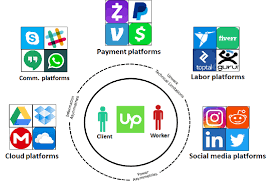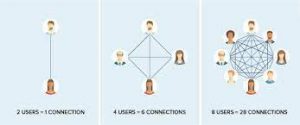There are many pros to using digital platforms. First, digital platforms are things like Amazon and FaceBook. They are used for interactions between consumers and businesses, online websites or aps. They are great for consumers to find out what businesses sell, information about the business, and learn about the people involved in running them.

This diagram shows some digital platforms and how they connect clients with the people from the business. Things like PayPal can be used to connect clients and workers for methods of payment. Even Instagram can make online shopping easier by allowing consumers to see what is new and link potential customers to more information. Digital platforms make business better because they allow for easy access online.
Network effects is also something we have discussed in class. This is when goods and services values increase based on consumer use. Facebook is not only an example of a digital platform but also an example for network effect. As more users use Facebook, their profit and net worth also grew. Through more users there are more networking opportunities for businesses find more clients. Here is a diagram that makes this make more sense. 
With more users making connections with businesses online, there is a better chance for new customers, new markets, and new income for the business. Connecting 4 users to a company has a much less impact than connecting 8 users. Therefore the network effect is an imperative role in business nowadays. It allows for online connection to increase business profits.
Hello Madison, I liked reading your post about digital platforms. I see you said the well-known ones are facebook and amazon. Do you know of any digital platforms that can be used for B2C and B2B?